Fighting for Net Neutrality in a Decentralized World
There’s a lot of doom and gloom surrounding the FCC’s effective repeal of legally codified net neutrality. But with adversity comes innovation, and the decentralized web is a concept for Internet infrastructure that can help people retain their digital rights. Today, we’ll explain it in full, plus present the top VPNs for restoring net neutrality.
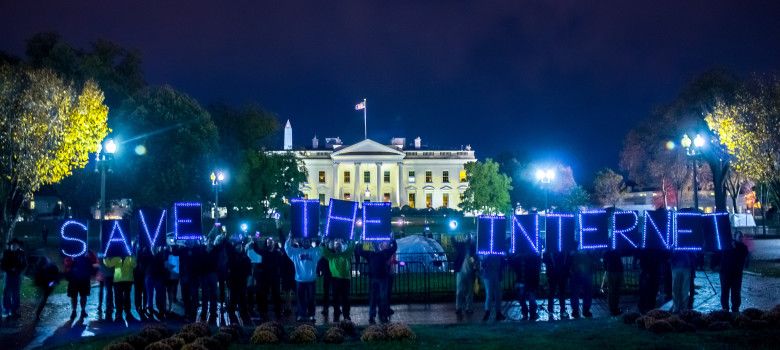
With net neutrality under threat in the U.S. and around the world, more and more people are looking at alternatives that keep the internet open and free. Efforts like decentralization and the decentralized web aim to push content into a digital world that isn’t controlled by any centralized authority. ISPs or government agencies can’t dictate what information you see or how fast it’s delivered on the decentralized web, allowing everyone to use an uncensored, completely neutral internet no matter where they live.
Don’t let governments and corporations dictate your Internet freedoms. Restore your anonymity and right to access the open web with these VPNs:
- NordVPN – Best Net Neutrality VPN – NordVPN can’t single-handedly solve the net neutrality problem, but it can keep a lifeline open to the free and open Internet no matter where in the world you are. With powerful NordLynx encryption, your activity is private and anonymous–like it should be.
- Surfshark – Scrappy young VPN with sophisticated tunneling, blanket obfuscation, zero logging, consumer-friendly policies, and low prices.
- ExpressVPN – Trusted provider with blazing fast speeds and servers that “just work” to unblock popular sites like Netflix.
- IPVanish – A great all-rounder, balancing privacy, performance, and price. Great for low-powered streaming devices like Firestick.
- VyprVPN – Connect to this provider’s 100% self-owned network via Chameleon encryption for total privacy–even in censored countries like China.
Today, we’ll take a look into what the decentralized web is, how it works, and the ways it can help preserve net neutrality.
Problems with Centralization
Current web communications protocols function in almost the same way as the earliest version of the internet. Data is stored on servers, users request pieces of that data, then it’s displayed in a browser–pretty straightforward. There are exceptions to this set-up though, most notably things like torrents, cloud technology, and blockchains, but the vast majority of web traffic is delivered using this one-to-one relationship. Want to watch a Netflix movie? Stream it from the servers they run, that’s your only option.
Big Business Interests
The early internet was actually decentralized. It used a mesh network of nodes that pinged information back and forth at incredibly fast speeds, no central authority necessary. As the internet took hold and businesses started to get involved, however, interest groups began biting little corners out of this distributed net. Those corner bites grew larger until suddenly most of the network was owned and operated by powerful businesses.
This is where the problem of centralization starts to become apparent. Google is probably the largest internet company in the world. If Google decides all searches for “rhubarb pie” should be blocked, for example, there’s nothing preventing them from doing so. Suddenly no one can find rhubarb pie recipes unless they go to a search engine that doesn’t rely on Google’s servers. The same holds true for any big web company. You can’t post on Facebook or Twitter without using servers they own, they control, and they manage.
The natural extension to this centralized model is pretty scary to think about. As web companies get bigger and gain more leverage, they can control larger chunks of the internet, affecting millions of new users. Even if they claim to be “for the people”, the only interest that drives them is maintaining their power and revenue streams. We’ve seen examples of this with deals made on the corporate level pushing certain services over others because money changed hands.
ISPs as Gatekeepers
Centralization gets really tricky when you look at internet access as a whole. What’s the first thing you do when you move to a new apartment? You call an internet service provider (ISP) and set up an account. ISPs control all web access because they operate the lines that transmit the data. You connect through their servers every time you access the web, no matter what site you visit or which device you’re using.
This incredible amount of power has so far been kept in check by government-level regulations. Until recently, ISPs in the U.S. have been required to deliver service as a public utility. They couldn’t shape traffic or choose which sites you visit because net neutrality laws were in place preventing them from doing so. Drop those laws, however, and the centralized ISP gatekeepers can do just about anything they want.
Decentralization and Net Neutrality

The closer net neutrality is to being destroyed, the more talk you’ll hear about decentralization. It’s not exactly a magic bullet for all neutrality-related issues, but it’s a great start for providing free and open access to information that isn’t shaped by one single entity. With a decentralized web, good services rise to the top because they’re good, not because your ISP or Google says so.
Concept of Decentralization
When we talk about decentralization we mean just that: creating something that doesn’t rely on a single center. Decentralization isn’t limited to technology, after all. Nearly any complex activity that requires individuals or individual pieces to operate can be decentralized. A decentralized government would move power away from senates or presidents, giving control over wider and smaller groups, for example. A decentralized human body could theoretically even survive without many of its organs, as no single function would be limited to a particular area.
The advantages of decentralization largely depend on the system that’s being decentralized. The main benefit common to all systems is a shifting of functions away from one location. Lose one part of the system and the rest survives, no matter what part you lost. Did a bunch of servers go down? Don’t worry, they were just part of the decentralized group, the network still survives. And if you’re a certain fictional dark wizard who wants to gain immortality, decentralizing your horcruxes is a really, really good idea.
Decentralized Infrastructure
The decentralized web isn’t some foreign thing separate from the internet you know and love. In fact, many parts of the web right now run on decentralized systems. To the end user everything on a decentralized web looks and acts the same. Type a URL into your browser, get a website, that whole business. Instead of having your traffic shaped or blocked by single companies, though, you get completely open access to the internet.
If net neutrality is lost on the common internet, a big shift towards using decentralized infrastructure may occur. In practice this means using technologies like torrent and blockchain to host content outside of company-owned servers. You’ll probably have to change the way you access the internet, but once you’re connected you won’t notice a difference.
Decentralized Web Products
Decentralization isn’t an all-or-nothing affair. The concept has only been growing in popularity over the years. Right now, thousands of apps and services are built on a decentralized platform, cutting out the middle man in favor of distributed hosting.
- Diaspora – A federated social network that operates as a decentralized alternative to Facebook.
- Mastodon – Alternative to Twitter that doesn’t rely on a single site or set of servers to run.
- Cryptocurrencies – You’ve heard of bitcoin and litecoin? These digital currencies are completely decentralized.
- Ethereum – The crypto-powered blockchain network hosts a huge variety of decentralized apps and services, everything from music platforms to crowdfunding.
- BitTorrent – Decentralized, distributed file hosting that doesn’t need a single host to function.
Plans for Decentralized Web Access
Let’s say net neutrality is lost around the world. A decentralized web is in place, however, providing access to all the content you could ever need. There’s still one big issue facing the common user: how do you get online? If ISPs control access to the internet itself, how can you sidestep them? Don’t worry, the good people of the Earth have thought of that one, too!
Meshnet Plan
Data passing through wired or wireless connections is broken into packets, each one tagged with your device’s unique IP address. ISPs pass these packets to their destination and return the data to your home network. This happens through the use of routers, just like the one sitting in your living room. Routers can communicate with each other just like they communicate with ISPs.
RELATED READING: How to Set up a VPN Router
The meshnet plan (wireless mesh network) aims to provide internet access to massive groups of people by pinging data across distributed sets of routers. The basic idea would have individuals running specialized software on their routers that helps packets “hop” from one local node to the next. Your request is passed along until it reaches the internet, then returns just like normal. It’s slower than a standard ISP connection and it requires enough local participants, but it works.
The interesting thing about meshnets is they build to a certain threshold, then suddenly explode. Imagine thousands of small groups each building their own little meshnet, such as neighbors in apartment buildings or houses along the same street. This has limited or even no functionality on its own, but if enough people do it, suddenly the network comes alive. You go from small and separate meshnets to one big meshnet that provides worldwide internet access to everyone, and all they had to do was a little tinkering with their home hardware.
Existing Mesh Networks
Meshnets aren’t a thing of the future. Several communities have already started building their own functioning mesh networks, bypassing ISPs and providing open internet access to everyone. The biggest example of this is NYC Mesh, which has active nodes in downtown Manhattan from Chinatown to the East Village.
Blockchain Network
One of the more technical but promising methods of sidestepping ISP access involves creating a blockchain network incentivized by cryptocurrencies. A blockchain network would work much like a mesh network only with a wider reach. Any web-enabled device could run software in the background that turns them into a network node. Each node passes requests just like routers in the mesh network example, providing slow but functional internet access to anyone on the block network.
Incentivizing this type of plan could be the key to high rates of adoption. If a mesh-based cryptocurrency were tied to the node software, users could get paid each time they handle a request. This would encourage more people to get involved, or even set up dedicated blockchain supernodes to provide more reliable access, all while getting paid!
Saving Net Neutrality
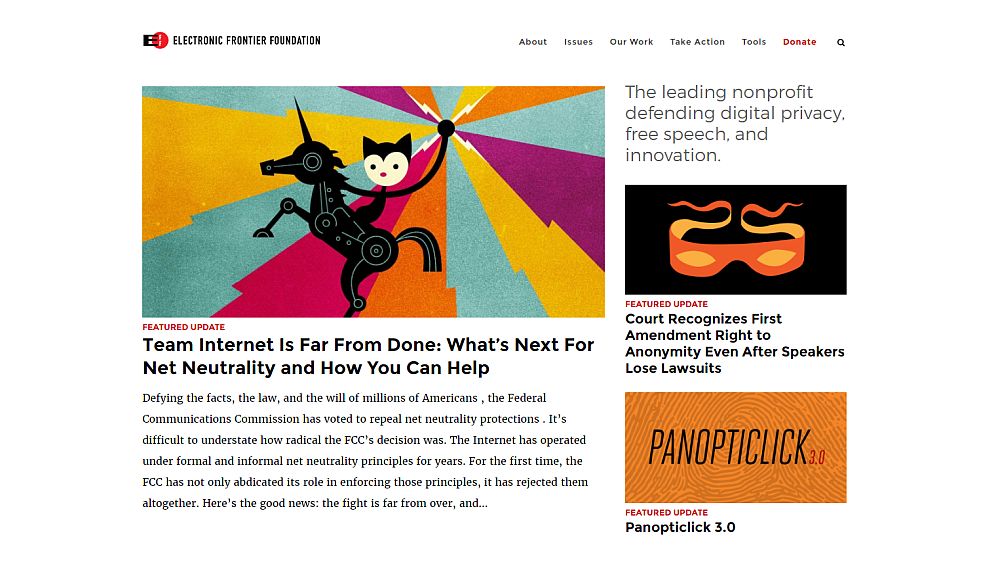
Meshnets and the decentralized web have their own benefits and drawbacks, even without net neutrality in the picture. Saving the open internet is in everyone’s best interest, however, regardless of their location. People are protesting and petitioning and taking action in a number of ways. Add your voice to the group to make sure our ‘net stays free!
Support Net Neutrality Organizations
ISPs and big internet companies are constantly trying to control more and more of the web, and they’re not afraid to cut us out of the picture in the name of profit. Fortunately there are groups like the Electronic Frontier Foundation (EFF) that work year-round to protect digital freedoms and online privacy. The EFF has been one of the big proponents of net neutrality, as well, providing outreach programs and legal action to keep the internet free.
Get Political
Net neutrality decisions are largely spearheaded by politicians. Getting the right people in office and sharing your concerns with current representatives are both key to keeping net neutrality safe now and in the future. BattleForTheNet has tools, contact information, and starter scripts to help you find local congressmen and stay informed about elections in your area. Don’t hesitate to call or write your representatives, that’s what they’re there for!
Share the Information
Awareness is a huge part of saving net neutrality. The more people who know about the dangers of losing it, the better. Talking about the issues with friends and family and sharing content on social media are great places to start. If you run a website, even if it’s just a small blog, Break the Internet has copy/paste images and scripts you can use to spread the word to visitors, as well.
Protect Your Freedoms with a VPN
What net neutrality boils down to is the freedom to browse the internet without third parties stepping in the middle. ISPs want to charge more for site access and faster speeds, and big companies want you to use their product over their smaller competitors. You just want to be left alone to enjoy the unrestricted world wide web, and that’s why using a VPN is a good idea.
Virtual private networks help mask your identity by encrypting data before it leaves your device. ISPs can’t read the packets, either, making it nearly impossible to determine what websites you’re visiting. This is a great way to regain some online freedoms, even in the wake of net neutrality repeal. Below are a few recommended VPN providers that will get you started.
1. NordVPN

NordVPN does some wonderful things for the VPN community, all thanks to its enormous network of 5,100 servers in around 60 different countries. Need extra features like double encryption or DDoS protection? No problem, there’s a server for that! How about onion over VPN or a dedicated IP address? NordVPN has you covered. Along with these incredible added features, you’ll always stay safe with standard 256-bit AES encryption, kill switch and DNS leak protection, and one of the most thorough zero-logging policies in the industry.
Read our full NordVPN review.
- SPECIAL OFFER: 2-yr plan (70% off - link below)
- Different IP addresses aervers
- No IP/DNS leaks found
- Extra-secure Double VPN for data encryption
- 30-day money back guarantee.
- Apps can sometime be slow to connect.
2. Surfshark

Surfshark is a new VPN built for the post-Net Neutrality Internet. It offers all the latest security features in an intuitive, affordable package anyone can use effectively. With 256-AES-GCM encryption via OpenVPN, IKEv2/IPSec, and WireGuard, you have what you need to dodge ISP surveillance and throttling. Moreover, built-in smart DNS and blanket obfuscation on each of their 3200+ servers (in 65 countries) help you access an entire world of geoblocked websites in complete anonymity.
While Surfshark is already cheap as dirt, you can actually split the cost with a friend thanks to unlimited simultaneous connections being allowed. Configure your VPN settings for specific Wi-Fi networks, and enjoy safer browsing with the CleanWeb suite, which blocks malware links, ad trackers, and popups before they can load. No matter what happens with Net Neutrality, you’ll be prepared with Surfshark.
- Break through harsh censorship to securely access social media and foreign news sites
- Unblock Netflix on any server, no more picking and choosing
- DNS leak and kill switch protection keep your defenses up even when your connection drops
- Logging policy independently audited and verified
- Helpful 24/7 live chat with an actual human being.
- Overall, not much to complain about
- Relatively young VPN still has to prove itself trustworthy over the long haul.
Read our full Surfshark review.
3. ExpressVPN
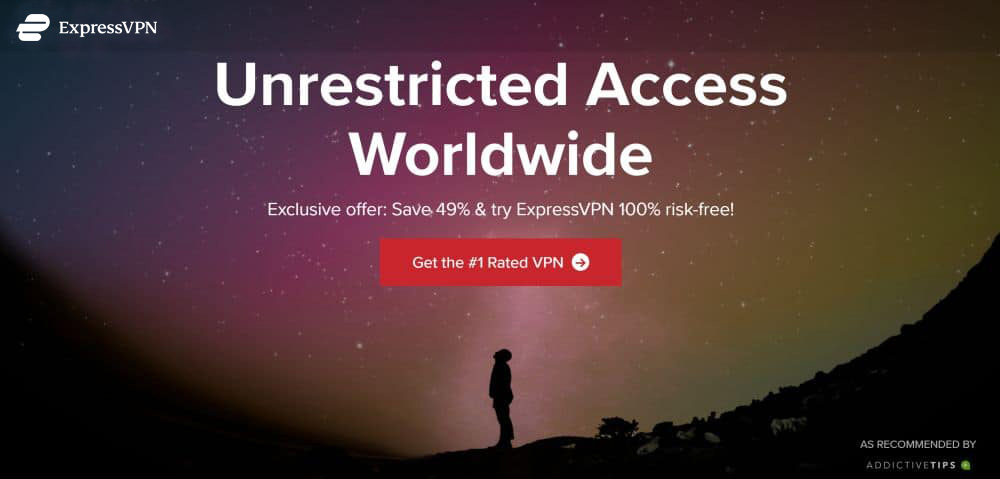
ExpressVPN is a superb VPN that provides great speeds and smart software for a wide variety of devices. It starts with a network of 3,000 servers in 94 countries around the globe, each one tuned for fast downloads no matter your location. You’ll also get to take advantage of 256-bit AES encryption, a great zero-logging policy, and both kill switch and DNS leak protection features for added privacy. If easy security and one-click connectivity on PC or mobile devices is high on your list, ExpressVPN is definitely for you!
Read our full ExpressVPN review.
- Unblocks US Netflix, BBC iPlayer and other streaming services
- Superfast servers (minimal speed loss)
- AES-256 encryption
- Keeps no logs of personal data
- Live chat support available.
- Priced slightly higher.
4. IPVanish
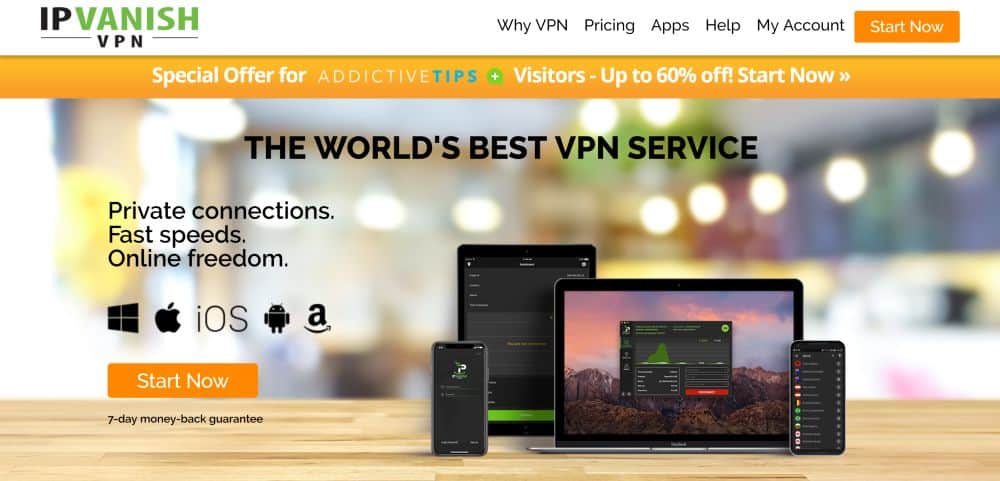
The balance of speed and security is tough get just right, especially if you’re a big VPN provider. As a general rule, the stronger your encryption, the slower your connections. IPVanish breaks that trend with impressive speeds and privacy features that keep you safe and anonymous each time you go online. IPVanish operates a network of over 1,300 servers, all of which are secured with 256-bit AES encryption, DNS leak protection, an automatic kill switch, and a zero-logging policy on traffic. Simply sign up and stay hidden online, it’s that easy!
Read our full IPVanish review.
5. VyprVPN
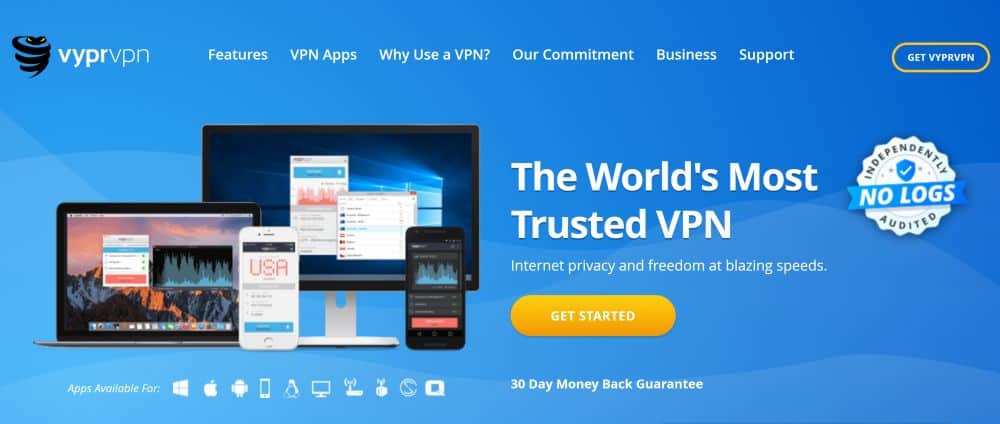
VyprVPN provides privacy like no other VPN, all thanks to a little feature called Chameleon. This exclusive protocol wraps metadata of each data packet in an extra layer of encryption, defeating deep packet inspection to help bypass even the toughest censorship blocks. This is alongside the company’s standard 256-bit AES encryption, DNS leak protection, kill switch feature, and a zero-logging policy that covers traffic and DNS requests. What’s more, VyprVPN maintains a modest but entirely self-owned network spanning 700+ nodes in 70 countries worldwide. No matter how bad things look, VyprVPN can keep you safe.
Read our full VyprVPN review.
Conclusion
The decentralized web can help restore the open internet to users around the world. When combined with efforts like the meshnet plan, it can even serve as an alternative to ISP web connections. Even if net neutrality is preserved, both offer benefits over the increasingly centralized nature of the modern internet. If you know of any other decentralized projects we should know about, mention them in the comments below!
If you need a VPN for a short while when traveling for example, you can get our top ranked VPN free of charge. NordVPN includes a 30-day money-back guarantee. You will need to pay for the subscription, that’s a fact, but it allows full access for 30 days and then you cancel for a full refund. Their no-questions-asked cancellation policy lives up to its name.

Please don’t forget Substratum and IPFS: Those two will be the first to save us from the hell of online government censorship.
Fidonet was a non-centralized network which preceded public Internet and worked outside of all government control via telephone network.
The Internet itself is designed to run as a decentralized network in order to increase survivability during a war.